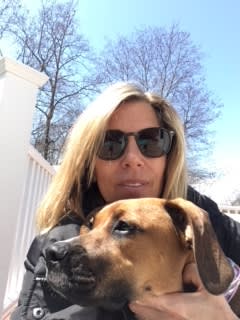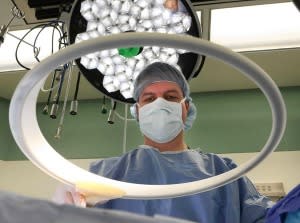By Helen A. Pass, MD, FACS, Co-Director, Stamford Health Breast Center, Chief of Breast Surgery
Did you know the same technology used to track a retail product can also help breast surgeons pinpoint the location of small targeted areas of the breast or associated lymph nodes during surgery?
If you have something in your breast area, cancerous or benign, you may not always be able to easily “feel” it even though a mammogram can detect it. We still, however, need a way to find its precise location and remove it. Traditional methods include inserting a thin wire on the day of surgery. Enter a more modern approach with enhanced detection... just as big as a coffee bean!
This technology is called radiofrequency identification, or RFID tagging and in the world of breast surgery, we call it RFID tag localization. This is a safe and effective procedure that makes lumpectomies—or surgical removal of breast tissue—easier for patients and surgeons.
Having options allows us to safely and accurately remove your cancer, giving you the best possible experience!
The Stamford Health Breast Center offers convenient access to the latest technologies, treatment approaches and supportive care. We closely adhere to robust national guidelines that help us determine the best treatment plans to fit everyone’s unique lifestyle.
The Stamford Health Breast Center is accredited by the National Accreditation Program for Breast Centers (NAPBC), a program administered by the American College of Surgeons. At the Breast Center, Dr. Pass and Valerie Brutus, MD, both fellowship-trained breast surgeons, closely collaborate with a team of dedicated breast radiologists, anesthesiologists, medical oncologists, radiation oncologists, skilled genetic counselors, and laboratory experts to ensure that patients receive the most accurate diagnosis, staging, treatment, and follow-up care.
Did you know the same technology used to track a retail product can also help breast surgeons pinpoint the location of small targeted areas of the breast or associated lymph nodes during surgery?
If you have something in your breast area, cancerous or benign, you may not always be able to easily “feel” it even though a mammogram can detect it. We still, however, need a way to find its precise location and remove it. Traditional methods include inserting a thin wire on the day of surgery. Enter a more modern approach with enhanced detection... just as big as a coffee bean!
This technology is called radiofrequency identification, or RFID tagging and in the world of breast surgery, we call it RFID tag localization. This is a safe and effective procedure that makes lumpectomies—or surgical removal of breast tissue—easier for patients and surgeons.
Stamford Health is one of the few centers that offers RFID tag localization and one of the very few which is doing it to locate and remove cancerous lymph nodes.
Dr. Helen Pass, Chief of Breast Surgery and Co-Director of the Stamford Health Breast Center, explains what RFID tagging means for women (and men, too!) who need lumpectomies.Can you briefly explain how the need for RFID tag localization technology came about?
Some tumors are so small that they cannot be felt. That is why we look to emerging technology, like RFID tagging to help us pinpoint these smaller tumors. We always say that, when it comes to breast cancer, detection is the best prevention!How does RFID tag localization work?
RFID tag localization uses radiofrequency technology to accurately pinpoint the tumor. Seeing exactly where the tumor is before surgery helps surgeons more effectively remove the entire tumor and spare surrounding healthy breast tissue.- At your first appointment, a breast radiologist inserts a small tag the size of a coffee bean into the tumor.
- The insertion itself takes less than 10 minutes and can take place days, weeks, or a month before surgery.
- On the day of your lumpectomy, your breast surgeon will then detect the tag with a handheld probe and remove the tumor.
Is RFID tagging for everyone?
No two breast cancers are alike and every woman’s breast tumor is different; therefore, RFID tagging is determined on a case-by-case basis. Whether or not it’s right for you depends very much upon the location of the tumor. The wire can sometimes get to areas where the RFID tag cannot.What are the benefits of RFID tagging?
There are quite a few!- Time: Two shorter appointments versus one longer surgery.
- Success: The success rate of lumpectomies is higher with this technology.
- Accuracy: RFID tags can be beneficial for women with cancer in their lymph nodes to ensure the cancer is accurately removed.
- Comfort: You can’t feel it, so you won’t even know it’s there!
Having options allows us to safely and accurately remove your cancer, giving you the best possible experience!
The Stamford Health Breast Center offers convenient access to the latest technologies, treatment approaches and supportive care. We closely adhere to robust national guidelines that help us determine the best treatment plans to fit everyone’s unique lifestyle.
The Stamford Health Breast Center is accredited by the National Accreditation Program for Breast Centers (NAPBC), a program administered by the American College of Surgeons. At the Breast Center, Dr. Pass and Valerie Brutus, MD, both fellowship-trained breast surgeons, closely collaborate with a team of dedicated breast radiologists, anesthesiologists, medical oncologists, radiation oncologists, skilled genetic counselors, and laboratory experts to ensure that patients receive the most accurate diagnosis, staging, treatment, and follow-up care.







)





